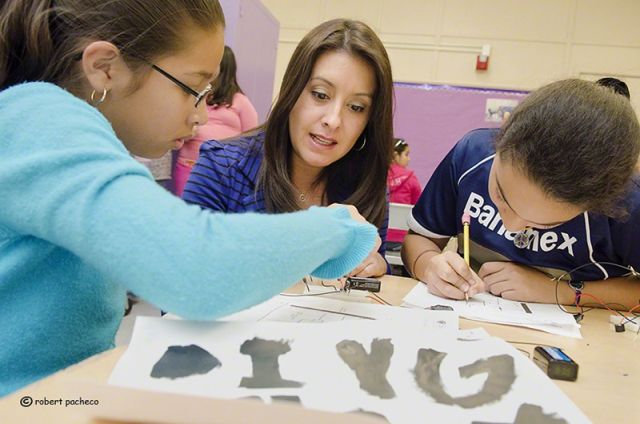
Creating video games, making clothes with electronic circuitry and designing apps are how some elementary school girls in a Los Angeles afterschool program are spending their time.
Do-It-Yourself Girls (DIY) is the brainchild of Luz Rivas and the program’s goal is to expose young girls to conceiving an idea and then working with their hands to bring it to fruition.
Rivas, who has an electrical engineer degree from Massachusetts Institute of Technology, created the nonprofit organization four years ago with about 30 girls and now it serves 400 girls. In 2015, it is expected to involve more than 500. It starts with girls in the fifth grade.
The organization’s official mission, according to DIY Girls website, is to “increase girls’ interest and success in technology, engineering and making through innovative educational experiences and mentor relationships. DIY Girls develops and implements educational programs and events designed to encourage engagement with technology, promote self-confidence and support aspiration to technical careers.”
“This is an opportunity to explore,’ Rivas said.
In time she would like to see the program expanded throughout Los Angeles and beyond the San Fernando Valley where it is currently focused.
Rivas, the daughter of Mexican immigrants was born and raised in Los Angeles and is the first member of her family to attend college, said that after graduating college she worked for Motorola but after doing volunteer work she realized she was much more interested in education.
“I realized I had a passion for education,” said Rivas.
She returned to school and earned a master degree in technology in education from Harvard. She has worked at Caltech, Center for Children and Technology and Iridescent to design programs to attract more women and underrepresented minorities to STEM fields.
“I decided I wanted to start my own organization in the community I grew up in,” said Rivas, noting that she chose fifth-grade girls because that’s the age she was when she first became interested in technology.
“Our approach is always being hands-on,” she explained.
The girls come through the program once or twice a week and are taught how to use tools and make things. However, Rivas emphasized that the girls are not told what to do or make but are encouraged to use their imagination and interests and conceive their own ideas.
“They are all related to engineering and technology,” she said. “They make things themselves and get to take them home.”
Girls who show an interest in hands-on activities are recruited for the program and Rivas said that initially many of the girls are unaware of what STEM involves.
“They just want to make things. They think it’s fun to make things with their friends,” she said.
In addition to the hands-on activities, girls in the program also are taken on field trips. In April 2015, DIY Girls attended the Society of Hispanic Professional Engineers regional conference at the University of Southern California. They toured the campus and met with engineers. Rivas said the girls enjoyed the leadership development activities and meeting engineers.
And while the program hasn’t been around long enough to gauge if it helps girls remain interested in STEM, Rivas said that so far the interest hasn’t diminished for many of the females.
“There are definitely still interested and they want more. We really try to provide that,” she said.
However, funding to keep her program going remains an issue. Like many other nonprofits, DIY Girls could do more if it had more financial resources.
The California Endowment recently awarded a $20,000 grant to DIY girls. The grant will be used to train participants from the afterschool program in the Pacoima community of Los Angeles to design and build interactive games and exhibits that address community health issues. After a brainstorming session in which health issues affecting their community will be identified, the girls will be asked to conceptualize an interactive exhibit design that addresses a health issue. Then they will work in small teams to build it. The project is designed to train girls in game design, coding and hands-on building of an exhibit. The project will culminate with a showcase for families where they will have the opportunity to interact and learn about the health issues from the exhibits.
Rivas encourages parents and people who don’t come from a STEM background to play a part in exposing young females to the joys and challenges of STEM.
“You don’t have to have all the right answers. You don’t have to know all about it. You just have to try,” she said.
Rivas said being hands-on capable and having an understanding how to conceive ideas and work them through will come in handy in the future.
“I think the future is going to have a lot of careers we don’t know about yet but will be technical in some way,” she said, adding that some may not require a college education but will be suited for those who with experience designing and building.
One of the projects DIY Girls’ staff is working on is a curriculum mirrored to DIY’s mission so others can have a roadmap to reaching more girls. She said she hopes it will be completed soon.
Rivas runs her program with a staff of five and a board of directors of nine. Support for the organization comes from a number of sources including General Motors, Raytheon, PPG Aerospace, United Latino Fund and the L.A. Lakers Youth Foundation.
DIY Girls is just one of a number of organizations seeking to support and bolster Latinas in their academic and professional pursuits. Other groups include L.O.V.E. Latinas on the Verge Excellence and Latinas Think Big.
The U.S. Army Corps of Engineers has been tasked with…
Brown and Caldwell, a leading environmental engineering and construction firm,…
Humboldt State University, one of four campuses within the California…